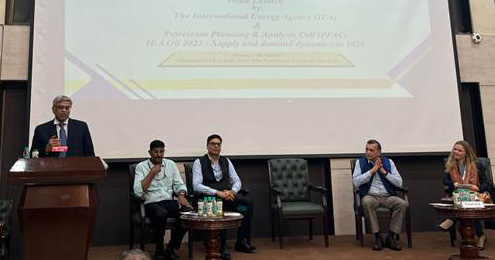The International Energy Agency (IEA) in collaboration with Petroleum Planning and Analysis Cell (PPAC) under the aegis of MoP & NG launched the Oil 2023 medium-term market report, titled: IEA Oil 2023 – Supply and demand dynamics to 2028, in Delhi today at an event that saw participation from the captains from the Indian oil and gas industry.
Speaking at the launch event, Shri Pankaj Jain, Secretary, MoP&NG in his keynote address said, “India`s demand for energy is growing faster than any other major economy and the same trend is expected to continue. Growth will come in all sectors due to favorable demographics supported by urbanization and industrialization.”
Talking about the consumption of petroleum products in FY 2022-23, the Petroleum Secretary said, “Last year the overall consumption of petroleum products was at 223 MMT, with a growth of about 12% over the previous year. This growth in the petroleum products has been driven by growth in HSD at 12.1%, the largest contributor with 85.9 MMT and MS with 34.9 MMT consumption during 2022-23 at a growth rate of 13.4% over the previous year.”
Speaking further, Shri Jain said, in both cases, volumes not only crossed pre-covid consumption by a margin but are also highest consumption in history, till date. The growth momentum continues in current year too. Secretary Petroleum also mentioned that India is the World’s 4th largest refiner, has the 4th largest LNG terminal capacity, 4th largest Auto market and also 3rd largest bio fuels producer. “India`s focus is on decarbonization and it has already achieved 12% ethanol blending in Petrol and has targeted for 20% blending by 2025”, he added.
The launch report of IEA finds that growth of global oil demand is set to slow down, almost coming to a halt by 2028. This is due to hastened shift towards cleaner energy technologies for energy security concerns. Despite robust demand from the petchem and aviation, annual demand growth is expected to decline from 2.4 mb/d in 2023 to just 0.4 mb/d in 2028, putting a peak in demand in sight.In particular, the use of oil for transport is set to decline after 2026 as the expansion of electric vehicles, the growth of biofuels and improving fuel economy reduce consumption. However, some economies, notably China and India, will continue to register growth throughout the forecast.
Commenting on India’s growth forecast on oil, Toril Bosoni, head of the oil industry and markets division at the IEA said, “Around three-quarters of the 2022-28 increase will come from Asia, with India surpassing China as the main source of growth by 2027”.
Alternate clean fuels like biofuels are expected to provide 10% of new liquid fuel supply growth to 2028. As per the report, biofuels production expands nearly 600 kb/d from 2022 to 2028, with Brazil, Indonesia and India combined accounting for 70% of this increase.
IEA report has assessed that global upstream investments in oil and gas exploration, extraction and production are on course to reach their highest levels since 2015, growing 11% year-on-year to USD 528 billion in 2023. Oil producing countries outside the OPEC+ alliance dominate plans for increasing global supply capacity in the medium term, with an expected rise of 5.1 mb/d by 2028 led by the United States, Brazil and Guyana. Saudi Arabia, the United Arab Emirates and Iraq lead the plans for capacity building within OPEC+. IEA has felt that this level of investment, if sustained, would be adequate to meet forecast demand in the period covered by the report. However, it exceeds the amount that would be needed in a world that gets on track for net zero emissions.
















